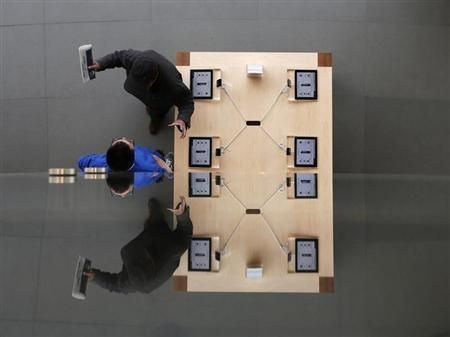
The chief executive of Apple apologized to the company's Chinese customers on Monday over iPhone warranty policy, saying the anger it generated in Chinese media outlets had prompted "deep reflection." He also said the company would work to better customer service in the country by revamping repair policies, improving communication with customers and strengthening oversight of resellers.
The apology comes as a reaction to a blitz of unfavorable attention in the government media. China Central Television criticized Apple's one-year warranty policy for the iPhone, pointing to a Chinese law mandating it be two years. It also criticized the company for not replacing the back cover of iPhones for free after interior repairs. The People's Daily, the Communist Party's official newspaper, published a series of editorials and articles, one of which bore the title, "Defeat Apple's Incomparable Arrogance."
The media criticisms kicked off on March 15, International Consumers' Day, when China Central Television took part in a tradition of inaugurating the day with negative press about foreign business, broadcasting an investigative report detailing how foreign companies in China abuse customers.
Cook's apology seemed to have worked to improve matters somewhat. After it was issued, the People's Daily published an article saying the apology had "eased the situation, softening the tense relationship between Apple and the Chinese market ... Its reaction is worth respect compared with other American companies," Reuters reports. The Chinese Foreign Ministry, meanwhile, praised Apple for responding "conscientiously."
The occasion is not the first time that Tim Cook has apologized over Apple's actions. Last year, he published a letter of apology to the company's customers in the US after it released an online maps services featuring a host of problems, including incorrect addresses and distorted aerial imagery.
But sparring between Beijing and Washington has complicated what might otherwise seem to be a bright future for foreign businesses in China. When Google announced in March 2010 that it would stop censoring search responses in mainland China and begin sending visitors to an uncensored search engine in Hong Kong, Beijing accused it of American "information imperialism." A recent report by the cybersecurity firm Mandiant tied a series of hacking attacks to the Chinese military. In response to the report and ongoing worries over security, Washington has sought to keep Chinese technological firms Huawei Technologies Ltd and ZTE Corp from accessing the US market. And two weeks ago, President Barack Obama signed a spending bill which includes a clause barring several US government agencies from contracting with firms linked to the Chinese government.
Since September, when the iPhone 5 was released, Apple stock has lost nearly 40 percent of its value, but the company's sales in China have been growing steadily, with sales there making up 13 percent of total sales, according to the New York Times. Revenues from the country reached $20 billion last year.
© 2025 Latin Times. All rights reserved. Do not reproduce without permission.




